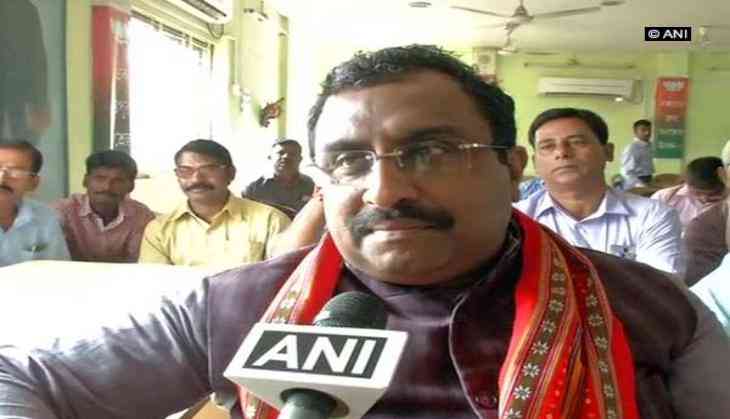
The real objective of Bharatiya Janata Party National General Secretary Ram Madhav's purported ode to democracy published in the Indian Express appears to be to shield his party's national leadership from criticism over their failure at the hustings in Karnataka.
Madhav has tried to cleverly argue that the blame for the BJP's inability to win absolute majority and form the government on its own lies at the doors of the party's state leadership.
The paeans to democracy that accompany his argument appear irrelevant, ironical and contrived, given the history of his own conduct as well as that of his party's.
The BJP's attempts at subterfuge in state after state have been amply documented. In the case of Arunachal Pradesh, Uttarakhand and Delhi and, most recently, Karnataka, the party's underhand tricks were overturned by the courts.
In all these cases, the judgements became a source of embarrassment for the high constitutional offices of the President, the Governor and the Chief Election Commissioner.
To see Madhav quote ethicists and wax eloquent on democracy for defending this kind of a record is deeply ironical. To cap it all, he himself is known as a poll 'manager' and he recently exposed his own belief in the 'all is fair' principle on live TV.
When asked about the party's plan of action if it failed to secure majority in the Karnataka Assembly, a chuckling Madhav told the show's anchors, “Hamare paas Amit Shah hai”. This was a brazen expression of pride over the reputation that the BJP's national president enjoys, of being adept in bending all kinds of electoral contests in his party's favour.
Bjp has made a mockery of democracy . Here bjp Leader Ram madhav openly accepts that bcoz they have Amit Shah they ll manage horse trading when they fall short of majority just like they did in Goa, Manipur, Meghalay, Arunachal and Bihar#BharatBachao pic.twitter.com/j0sqREkyS3
— Vinay Kumar Dokania (@VinayDokania) May 30, 2018
That even Shah could not manage to finally deliver the state to his party turned out to be deeply embarrassing for them. Congress and the Janata Dal (Secular) gave Shah and his party a bitter dose of their own medicine by denying them the chance of forming a government in spite of emerging as the single largest party.
The fact that there was nothing illegal about it showed the BJP that it was time the party stopped believing that it alone possesses the tricks that help parties move ahead in the cut-throat arena of politics in India.
At the end of the day only one fact remained. While the governing Congress was given a thumbs-down by the electorate, the BJP too failed to win the required confidence of the people. Who was responsible for it is a matter of debate and analysis.
What Madhav's arguments indicate that the BJP wants its chief ministerial candidate BS Yeddyurappa to bear the burden of failure on his shoulders, so that people do not get the chance to associate it with Shah or Prime Minister Narendra Modi.
Why else would he argue that “Assembly elections, especially in states in the country’s south and east, need strong regional leadership” and that “the provincial leadership of the BJP in respective states should be asked to shoulder the greater burden?”
However, how does the BJP expect people to believe that? Didn't Shah spend months preparing the party's electoral strategy for Karnataka? He didn't leave anything to chance on the ground too and campaigned in almost all of the 30 districts of the state.
Modi, the party's campaigner in chief, was to be the man of the match, a magic batsman of sorts who will come in in the slog overs and take home the trophy for his team.
The PM addressed as many as 21 rallies in the state, as Madhav himself admits, and yet failed to act as the clincher. Average BJP voters are upset that the party failed to upstage Congress even in the underhand tricks department.
The loud and clear message of Madhav's piece is that the unexpected turn of events in Karnataka has got the BJP's goat. The party is facing great difficulty in digesting that the Opposition may finally be gaining some ground and beginning to understand what may work for it in 2019.
That's the reason why Madhav, Shah and Modi are slamming opposition parties' efforts to unite as an “unholy and unprincipled alliance”. They are telling their followers that thugs are ganging up against them.
To win, they are appealing for an overwhelming majority in the next Lok Sabha polls, a 51% mandate, through even bigger numbers than what the party got in 2014.
Even the party's most ardent well-wishers are doubting that, as of now.
First published: 30 May 2018, 18:58 IST


